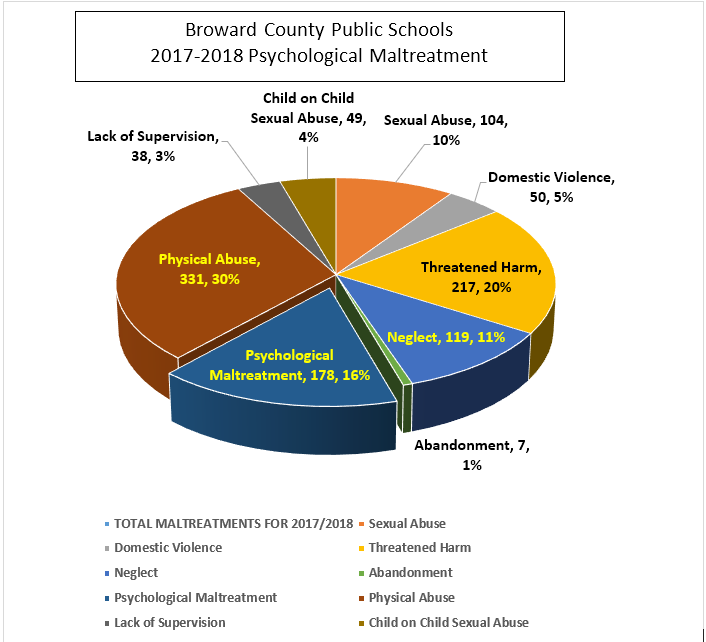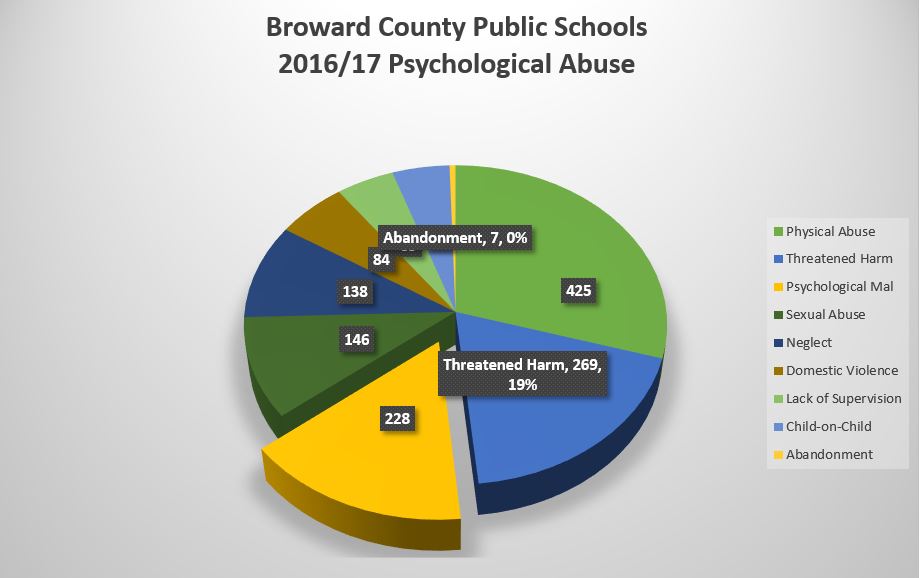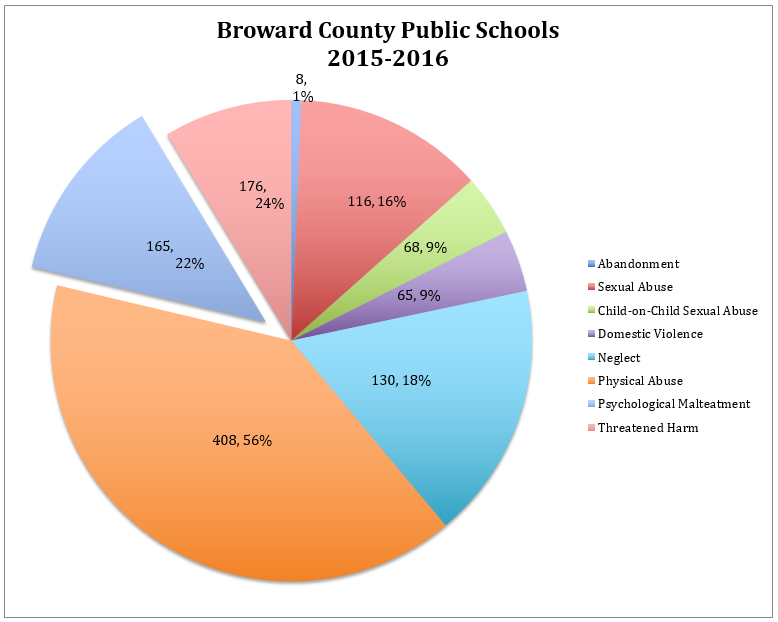- Broward County Public Schools
- Child Abuse & Neglect Prevention Services
- Training Directions
- Psychological Maltreatment
Psychological Maltreatment

Psychological Maltreatment
-
Definition
Psychological maltreatment is not a term that is defined in Florida statute. Instead, Florida Statute 39 includes this area in the definition of harm. “Harm” to a child’s health or welfare can occur when any person inflicts or allows to be inflicted upon the child physical, mental, or emotional injury. In determining whether harm has occurred, the following factors must be considered in evaluating any physical, mental, or emotional injury to a child: the age of the child; any prior history of injuries to the child; the location of the injury on the body of the child; the multiplicity of the injury; and the type of trauma inflicted.
“Mental injury” means an injury to the intellectual or psychological capacity of a child as evidenced by a discernible and substantial impairment in the ability to function within the normal range of performance and behavior.
Some degree of psychological maltreatment is involved in any situation of child abuse and neglect, unless the child is killed. The emotional message of abuse and neglect to a child is that the person who is supposed to love you and take care of you is not doing so. This emotional message may have long-lasting effects, and yet is often not addressed during protective intervention. And those who report suspected abuse to the hotline often fail to consider and report the mental harm. This form of maltreatment is usually chronic and intense.
Broward County Public Schools uses a theoretical construct of psychological maltreatment that defines five main types of psychological maltreatment:
(1) Ignoring- failure to attend to a child’s needs on a consistent basis; deliberate withholding of nurturance and emotional support
(2) Isolating- Preventing the child from engaging in normal social interaction within the family and with peers
(3) Terrorizing- Physically or verbally threatening the child. This also includes the home situation where chaos and violence are the norm, such as domestic violence situations.
(4) Rejecting- Active failure to meet the child’s needs.
(5) Corrupting- Seeking to make the child unfit for normal social roles.
-
Indicators
Physical Indicators
- Speech disorders
- Lags in physical development
- Failure to thrive (especially in infants)
- Asthma, ulcers, severe allergies (when occurrence seems chronic and stress related).
Due to the nature of psychological maltreatment, most indicators are behavioral:
- Anxiety disorders, such as sucking, biting, rocking, facial tics, enuresis (bed wetting), encopresis (fecal soiling) or eating disorders
- Withdrawal, depression, anti-social behaviors (cruelty to animals, themselves, others, stealing, setting fires)
- Sleep disorders, inhibition of play
- Chronic verbalizations of illness, school phobic behaviors (irrational fear of school attendance)
- Behavioral extremes: compliant, passive or aggressive, demanding
- Overly adaptive behavior: inappropriately adult or infantile
- Lags in emotional and intellectual development
- Delinquent behaviors
- Threatens or attempts self-harm or suicide
- Drug/alcohol misuse
- Shows diminished cognitive ability.
Parental behaviors for the five main types of psychological maltreatment are:
-
Ignoring
-
Pays no attention to the child
-
Doesn’t care whether the child is home for meals or at bedtime
-
Fails to report a runaway child as missing.
-
Isolating
-
Refuses to allow the child to go out to play
-
Refuses to allow the child to bring friends home
-
Refuses to allow the child to participate in extracurricular activities at school, church, etc.
-
Confines the child at home (usually to a bedroom)
-
Locks the child in a room or closet
-
Ties the child with ropes, chains or other restraints
-
Won’t let the child eat with the family or be involved in other family activities.
-
Terrorizing
-
Constant yelling and screaming at the child
-
Deliberately scaring the child
-
Telling the child that a pet, the child, or family member will be hurt if the child doesn’t behave a certain way
-
Repeatedly waking the child up during the night for no reason.
-
Rejecting
-
Blames and belittles the child constantly
-
Compares the child unfavorably to others on a consistent basis
-
Will not listen to the child
-
Pushes the child away frequently
-
Makes verbal statements which undermine the child’s self-esteem:
“I hate you!”
“You’re no good!”
“I wish you were never born!”
-
Corrupting
-
Allows the child to be used for Pornography/Prostitution (VIDEO CLIP)
-
Uses a child for other illegal purposes (such as to sell drugs, burglarize homes).
Family Characteristics
- Parents blame the child for all of the family’s problems (or ignore the child’s problem)
- Parents refuse all offers of help or referrals for help
- Parents seem unconcerned about the child’s welfare
- Parents verbalize abrasive and rejecting descriptions of the child on a consistent basis.
-
Data
In the 2017-2018 school year, 16 percent of the reports made by Broward County Public Schools employees to the Florida abuse hotline involved psychological maltreatment



-
Resources
Intervention is sometimes difficult when psychological maltreatment is suspected. It may be difficult to establish impairment to the child’s social, emotional, or intellectual capacities. However, schools are in a unique position to establish this impairment, as we have much information related to cognitive ability, academic achievement, behavior problems, social functioning, and range of affective expression. It is also difficult sometimes to establish that the child’s impairment is a result of specific acts or omissions by caregivers. Again, the school may be the source of crucial information as a result of student statements, parent participation or lack thereof, and the nature of communication between parents and school.
Student support personnel, due to their education and experience, are often able to help parents/caregivers perceive the effects on children of their words and actions. Many parents respond to the stressors present in their own lives, and simply do not see how their interactions with their children are harmful to development and functioning. Referral to the district’s Family Counseling Program may be very helpful for these families. Contact your nearest Family Counseling Program, e-mail Rosemary Russo , or call (754) 322-3153.
Child Study Team is a good process for addressing situations that may reflect psychological maltreatment. The team might include the guidance counselor, teacher(s), school social worker, school psychologist, family counselor, an administrator, and other school staff or partnership staff who have contact with the student and family. It is important to collect and assess information from everyone in order to properly identify and document problems. Report to the Florida abuse hotline at 1-800-96-ABUSE if there are indicators of impairment in emotional, social or intellectual functioning. The maltreatment should be chronic and intense. Be prepared to state specific caregiver behaviors that are responsible for impairment, and identify all interventions by the school.
In Broward County, there are agencies that may assist in locating or providing outside services for students and families:
- First Call for Help 211
- Broward Family Center (Ungovernable Children) (954 486-4222
- Lippman Family Center (Respite Care): Sponsor of Safe Place Program (954) 568-2801
- Covenant House (Shelter for Adolescents) (954) 561-5559
-
TO REPORT CHILD ABUSE, CALL 1-800-96ABUSE

